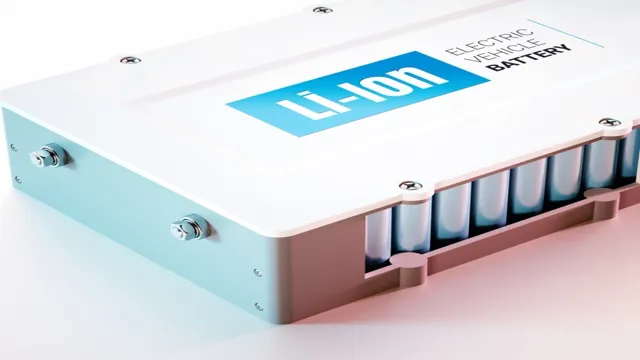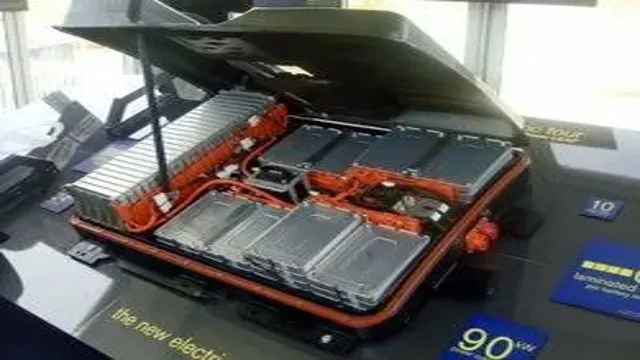The Shocking Truth about Electric Car Battery Disposal Fee: Everything You Need to Know
If you’re considering making the switch to an electric car, one of the most critical factors to consider is the battery’s lifespan. While electric car batteries can last up to a decade, there will eventually come a time when your battery needs to be disposed of. But what exactly are the costs of disposing of an electric car battery? Unlike traditional car batteries, electric car batteries are far more complex and have many layers of components.
Additionally, these components are often environmentally hazardous, and improper disposal can lead to dangerous pollution levels. As a result, there are several factors to consider when it comes to the cost of disposing of an electric car battery. First, the cost depends on the size and weight of the battery.
Larger batteries, such as those found in Tesla vehicles, come with a higher price tag for disposal. Additionally, the location of the disposal facility can also affect the cost, as some facilities may charge more for processing hazardous materials. Finally, the cost of disposing an electric car battery may also depend on the type of disposal method used.
While recycling the battery is often the most eco-friendly option, some facilities may charge more for recycling than standard disposal methods. In conclusion, the cost of disposing of an electric car battery is not straightforward and requires careful consideration. As electric cars continue to gain popularity, it’s essential to factor in disposal costs when assessing the overall cost of ownership.
Understanding the Disposal Process
As electric cars become more popular, the disposal of their batteries has become an important topic. It’s not just a matter of throwing it away in the trash and having it sent to a landfill. The disposal process is complicated, and there are fees involved.
These fees are put in place to ensure that the batteries are disposed of properly, as they contain toxic chemicals that can harm the environment if not handled correctly. The disposal fee for an electric car battery can vary depending on where you live and the type of battery your car uses. Some companies may offer battery recycling programs that take the old battery and repurpose it for other uses.
If you’re planning on getting an electric car, it’s important to factor in the disposal fee when considering the overall cost of ownership. By properly disposing of your electric car battery, you can help protect the environment and ensure a cleaner future for everyone.
Step 1: Battery Removal
When it comes to removing a battery, it’s important to understand the disposal process. Batteries contain chemicals and materials that can be harmful to the environment if they’re not disposed of properly. Depending on the type of battery, there are different regulations and guidelines for safe disposal.
For example, lithium-ion batteries, commonly used in electronics, can catch fire if not handled properly, so they should be recycled at facilities that specialize in handling hazardous materials. On the other hand, alkaline batteries, often found in household items, can be disposed of in the regular trash, but it’s best to check with your local waste management facility to see if they have any specific guidelines. By following these guidelines and properly disposing of batteries, we can help protect the environment and prevent potential harm.

Step 2: The Disposal Process
The disposal process can often be a confusing and overwhelming concept for many individuals. However, understanding this process is essential for ensuring that we dispose of our waste in an environmentally responsible manner. The process typically involves collecting waste materials from households, businesses, and public spaces and transporting them to a landfill or recycling facility for proper disposal.
Once at the facility, the waste is sorted and processed to separate recyclable materials from non-recyclable ones. The recyclable materials are then sent to recycling facilities, while the non-recyclable ones are either incinerated or buried in a landfill. It is crucial to note that improper disposal of waste can have a devastating impact on the environment, including contamination of water sources, soil, and air pollution.
Therefore, it is vital to dispose of waste in a responsible manner. By doing so, we can significantly reduce our carbon footprint and help protect our planet.
Factors Affecting Disposal Costs
When it comes to disposing of the battery of an electric car, there are several factors that can affect the disposal costs. The first factor is the size and weight of the battery. As the battery size and weight increase, so does the disposal fee.
The second factor is the state of the battery. If the battery is damaged, it may require special handling, resulting in additional costs. Thirdly, the location of the disposal facility can also affect the cost.
Some areas have higher disposal fees due to stricter environmental regulations. Finally, the type of battery technology used will also affect the cost. Lithium-ion batteries, for example, are more expensive to dispose of compared to lead-acid batteries.
In conclusion, when considering purchasing an electric car, it is important to factor in the potential disposal fee for the battery to ensure that the overall cost of ownership is within your budget.
Battery Type
Battery disposal costs can vary depending on the type of battery being disposed of. The factors that affect these costs include the size of the battery, the material it’s made from, and the method used to dispose of it. For example, lithium-ion batteries are more expensive to dispose of than traditional alkaline batteries because they are more complex and require specialized processes.
Additionally, some batteries contain toxic materials such as lead and mercury, which require extra handling and safety precautions during disposal. Disposing of batteries properly is not only important for preserving the environment but also for mitigating potential hazards associated with improper disposal. As a responsible consumer, it’s essential to take the necessary steps to dispose of batteries safely and appropriately.
Size and Weight
When it comes to disposing of waste, size and weight are two factors that significantly affect the costs. Generally, larger and heavier items require more resources for transportation, handling, and processing, resulting in higher disposal fees. This is because they require more space and time to be sorted, transported, and treated.
Moreover, they may also put a strain on the equipment and facilities used, requiring more maintenance and repairs, which adds up to the overall cost. On the other hand, smaller and lighter items may not have as much impact on the disposal fees, as they are more manageable and easier to process. Therefore, it’s important to consider the size and weight of the items when deciding how to dispose of them to minimize the costs and make the process more efficient.
State and Local Regulations
State and local regulations can significantly impact the costs of waste disposal. There are various factors that can affect the costs, such as the type of waste being disposed of, the location of the disposal facility, and the fees set by local authorities. For instance, hazardous waste disposal can be extremely expensive due to the stringent regulations in place to protect public health and the environment.
On the other hand, the costs of disposing of non-hazardous waste can be lower in some areas where disposal facilities are abundant. Additionally, transportation costs can also play a significant role in determining the final cost of waste disposal. Furthermore, waste management companies are required to comply with state and local regulations governing their operations, which can also add to the costs of waste disposal.
This includes obtaining permits, investing in specialized equipment, and ensuring compliance with strict guidelines. The complexity of complying with these regulations can be a challenge for waste management companies, particularly for small businesses with limited resources. Overall, understanding the various factors that affect the costs of waste disposal is essential for waste management companies and businesses generating waste.
By being aware of state and local regulations and proactively addressing compliance issues, companies can minimize their disposal costs and avoid penalties for noncompliance. Ultimately, effective waste management practices will help protect the environment, conserve resources, and promote sustainability.
Disposal Options and Associated Costs
The disposal fee for an electric car battery can vary depending on the options available. One eco-friendly option is to recycle the battery, and many auto parts stores offer recycling programs. Some car manufacturers may also take back old batteries for recycling.
The cost for recycling an electric car battery usually ranges from $0 to $50 or more, depending on whether the recycling is done through an auto parts store or a specialized facility. If recycling is not an option, another option is disposal in a landfill. However, this is not an ideal solution, as electric car batteries can release toxic chemicals into the environment.
The cost for landfill disposal can vary widely, but it usually starts at around $10 and goes up from there. When purchasing an electric car, it’s important to take into consideration the eventual disposal of the battery and make a plan accordingly.
Private Recycling Companies
If you’re looking to dispose of your waste through a private recycling company, there are various options available to you. One popular option is curbside pickup, which involves placing your recyclables on the curb outside of your home or business for pickup on designated days. This is a convenient and time-efficient option, but it may come at a higher cost compared to other options.
Another option is drop-off centers, where you can transport your recyclables to a specific location at your own convenience. This option can be more cost-effective, but it also requires more effort and time on your part. Some private recycling companies may also offer customized pickup and transport services for larger quantities of recyclables.
When considering the associated costs, it’s important to factor in the type and amount of recyclables you have, transportation costs, and any additional fees. It’s also important to do your research and choose a reliable and reputable private recycling company that aligns with your values and sustainability goals. By taking the time to explore your options and choosing the best disposal method for your needs, you can effectively reduce waste and contribute to a more sustainable future.
Automaker Programs
Automaker programs can be a great resource for individuals looking to dispose of their vehicles. Many automakers offer programs that allow customers to trade in their old vehicles for new ones at a discounted price, or even receive cash incentives for their trade-ins. However, it’s important to understand the associated costs before participating in these programs.
For example, some automakers may require that the vehicle be in good condition with low mileage, or may charge fees for processing and disposal of the old vehicle. Additionally, those who choose to trade in their vehicles may receive a lower trade-in value than if they were to sell the vehicle privately. While these programs can provide an easy and convenient way to dispose of old vehicles, it’s important to weigh the potential costs and benefits before making a decision.
Conclusion and Final Thoughts
In the end, it’s clear that electric cars offer a host of benefits for the environment and drivers alike. But as we become increasingly dependent on these vehicles, it’s important to consider the disposal fee for their batteries. While it may seem like a nuisance, this fee is essential for ensuring that these batteries are disposed of in a safe and sustainable way, without harming the environment or local communities.
So while there may be some upfront costs to owning an electric car, the long-term benefits are well worth it – and ultimately, we all have a responsibility to do our part for the planet.”
FAQs
What is a disposal fee for electric car battery and why do I have to pay it?
A disposal fee for electric car batteries is a fee charged by many recycling facilities for the proper disposal of old or used batteries, as they contain hazardous materials. It is required by law to properly dispose of these batteries to prevent harm to the environment.
How much does a typical disposal fee for an electric car battery cost?
The cost of a disposal fee for an electric car battery may vary depending on the recycling facility or location. However, the average range is between $5 to $25 per battery.
Can I recycle my old electric car battery for free?
Some recycling facilities may offer free recycling services for electric car batteries. However, it is best to check with your local recycling center to confirm if they do, and what their policies and requirements are.
What are some alternative options to paying a disposal fee for an electric car battery?
Some alternative options for disposing of your old electric car battery include: finding a local recycling center that offers free recycling services, donating the battery to a research facility or university for research purposes, or selling the battery to companies that specialize in reconditioning and reselling electric car batteries.





